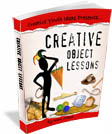About Simulation Games
A simulation game is used to introduce youth to real life in “simulated” activites (much like an airline pilot gets to fly a simulator before the give him/her the real thing to mess up). A simulation game is a structured activity that approximates, but does not exactly reproduce, situations in every day life. They create a controlled environment in which issues can be realistically examined through personal experience. The key to simulation games is the “de-briefing” at the end, when the implications are discussed. At times the experience may be staged to look like a real event. At other times the youth are aware they are participating in a simulation.
Game Description
You can use this simulation game to lead participants into a discussion about variety of issues:
- How to better listen to God
- Trusting other people
- The effects of various influences in our lives
- Learning how to discern the love of God in a world where people deceive you.
Game Objective
The objective is for the blind folded person to walk from one side of the room to the other without touching one of the sheets of paper randomly scattered across the floor.
Game Materials
A stack of letter-size paper…about 30-50 sheets. (cool colors if you have them). One blind fold. You can also write various issues youth may face on the pieces of paper. Some examples are: premarital sex, lying, drinking, smoking, dating a non-Christian, cheating, respecting parents, speeding, stealing, peer pressure, hatred, revenge, unwillingness to forgive, making fun of others, Speaking words of discouragement, ridicule, refusing to talk to someone, drugs, pornography, lewd jokes, gossip, lust, envy, greed, addictions, anorexia, bulimia, overeating, not doing your best, etc.
Game Duration
It will take 5-10 minutes per person to do the simulation. Debrief can be adjusted depending on your requirements.
Game Preparation
- Write one issue on each piece of paper (Optional)
- Randomly distribute the sheets of paper across the floor.
Game Play
- You might want to have more than one person play the game so that you can have more perspectives for the debrief. Have those awaiting their turn wait in another room with a leader so that they do not catch on to what is happening. Call them into the room one by one.
- Before the participant enters the room, choose one youth to be the voice of the Holy Spirit. The blind folded person can not know who this person is going to be. As variations, use people they trust in some of the scenarios, and people they don’t know well in others.
- Blindfold the participant and tell them that their goal is to reach the other side of “life” without touching the sheets of paper.
- Line the rest of the group up along the two side walls of the room – They cannot come next to the blindfolded person, and cannot touch them. Neither can they move from their starting positions. Only the person playing the “Holy Spirit” can move along the walls.
- The rest of your group tries to get the blind-folded person to step on the squares of paper. They can only do this by providing verbal directions to try to influence the blindfolded participant.
- The challenge for the blindfolded person is to listen to the voices and try to discern who to follow and trust. Most of the time they will fail and listen to the wrong person.
Optional Activity
If you have written various issues on the sheets of paper, distribute them to the youth. You may want to have youth list the various influences that affect our decisions on these issues. What is God’s standard on this issue? What is the correct response when confronted with this issue?
Debrief
You can focus on a variety of issues:
- How to better listen to God: How do we recognise the voice of God in our lives? How do we know when it is God speaking, and not our own thoughts? How do we know we can trust the voice of God for guidance? What influences are strongest in your life? Why? How can we learn to better recognise God’s voice?
- Trusting other people: How do you know who to trust? Can those we trust mistakenly mislead us at times? Do we sometimes betray the trust of others accidentally or even intentionally? How can you be a positive influence in the lives of those around you?
- The effects of various influences in our lives: What are the greatest influences in your life? How much does peer pressure affect you? How can we influence our sensitivity to the influence of God’s Spirit in our lives?
- Learning how to discern the love of God in a world where people deceive you.: Why does God allow us to go through trials and struggles? Does God tempt us? How can a loving God allow such evil in the world?

 MORE IDEAS? See “Creative Object Lessons”
MORE IDEAS? See “Creative Object Lessons”
200 page e-book that explains everything you need to know when planning your very own object lessons. It contains 90 fully developed object lesson ideas and another 200 object lesson starter ideas based on Biblical idioms and Names / Descriptions of God.
Learn More…

 Icebreakers Ahead: Take It To the Next Level
Icebreakers Ahead: Take It To the Next Level


 Game Description
Game Description